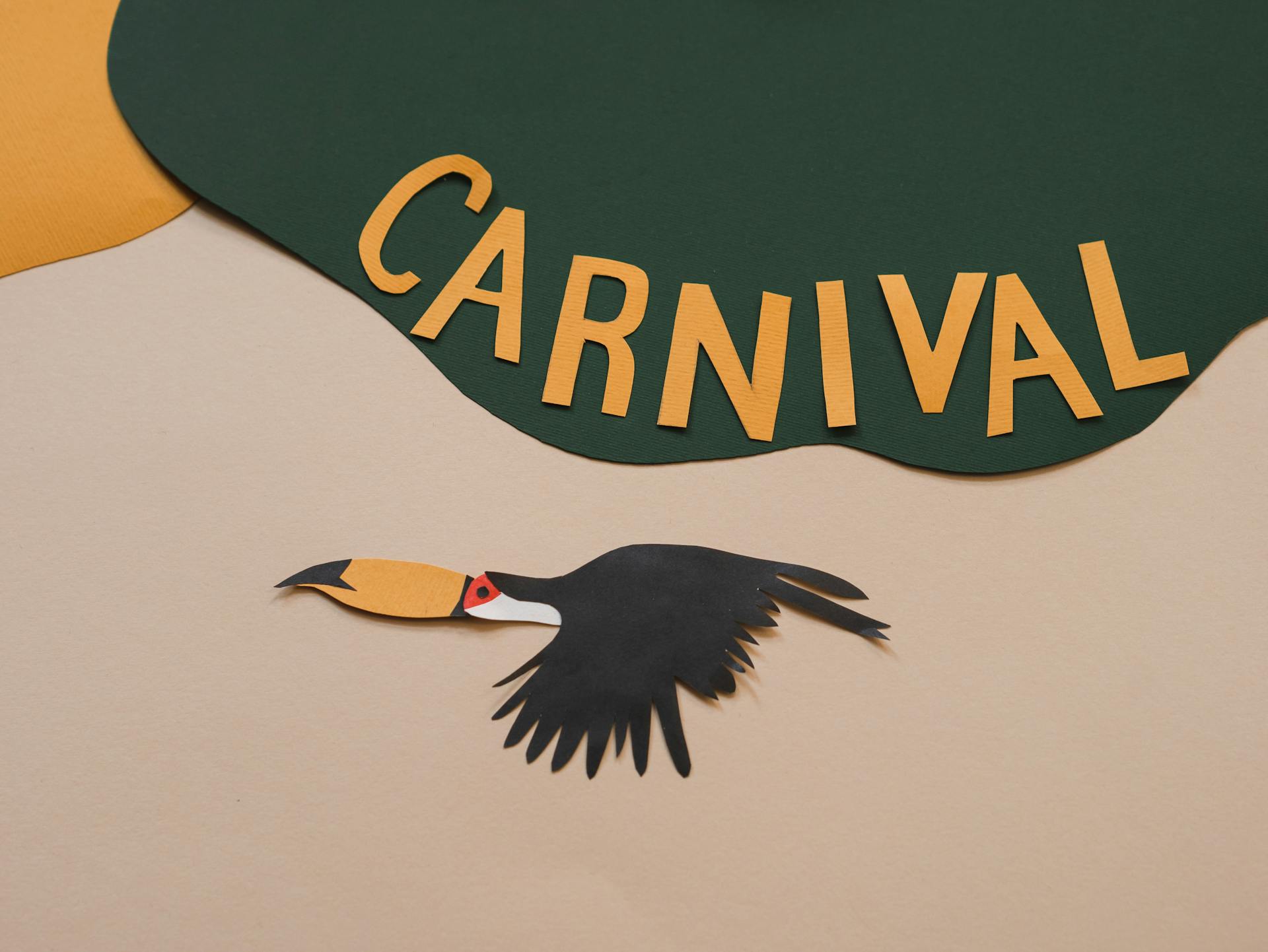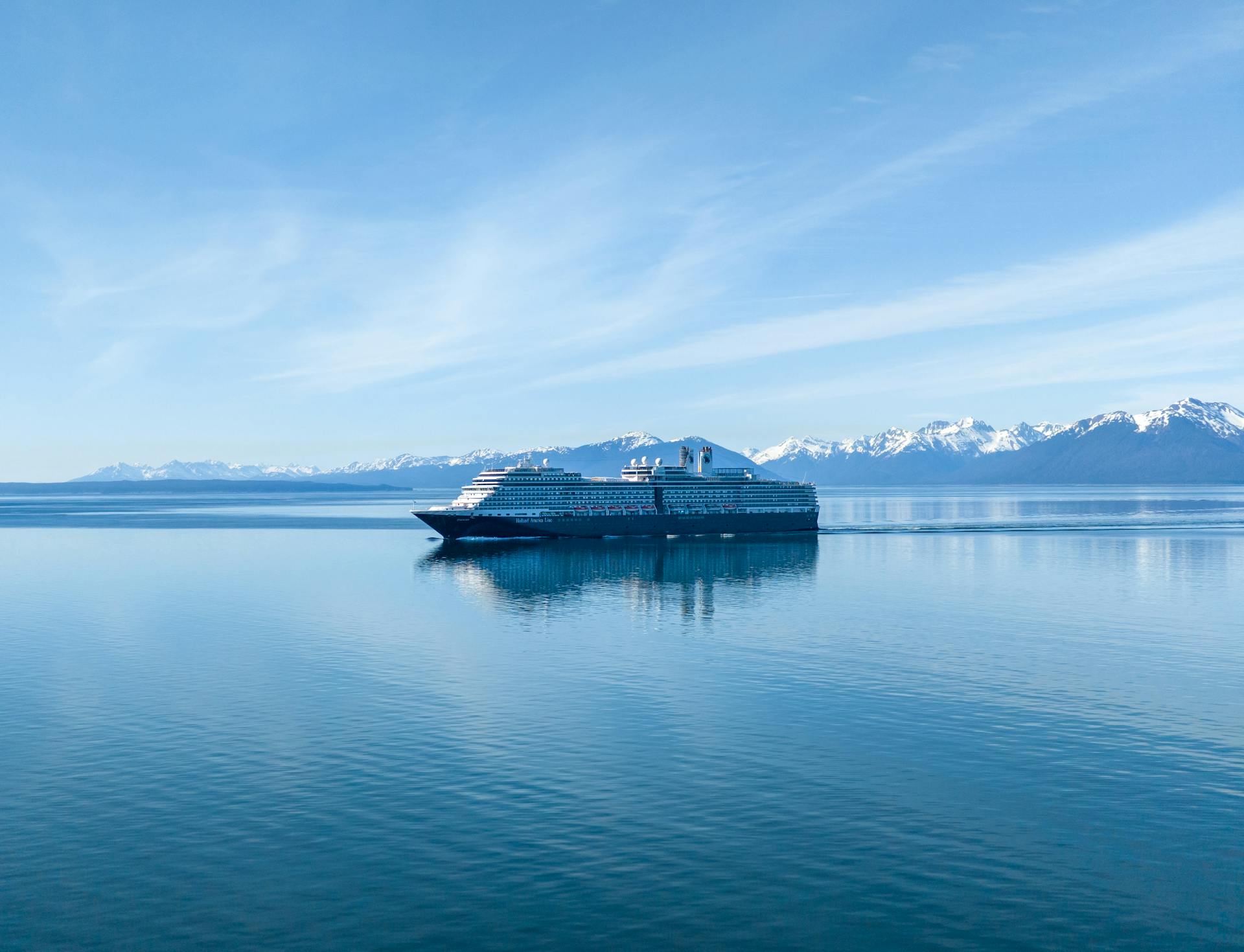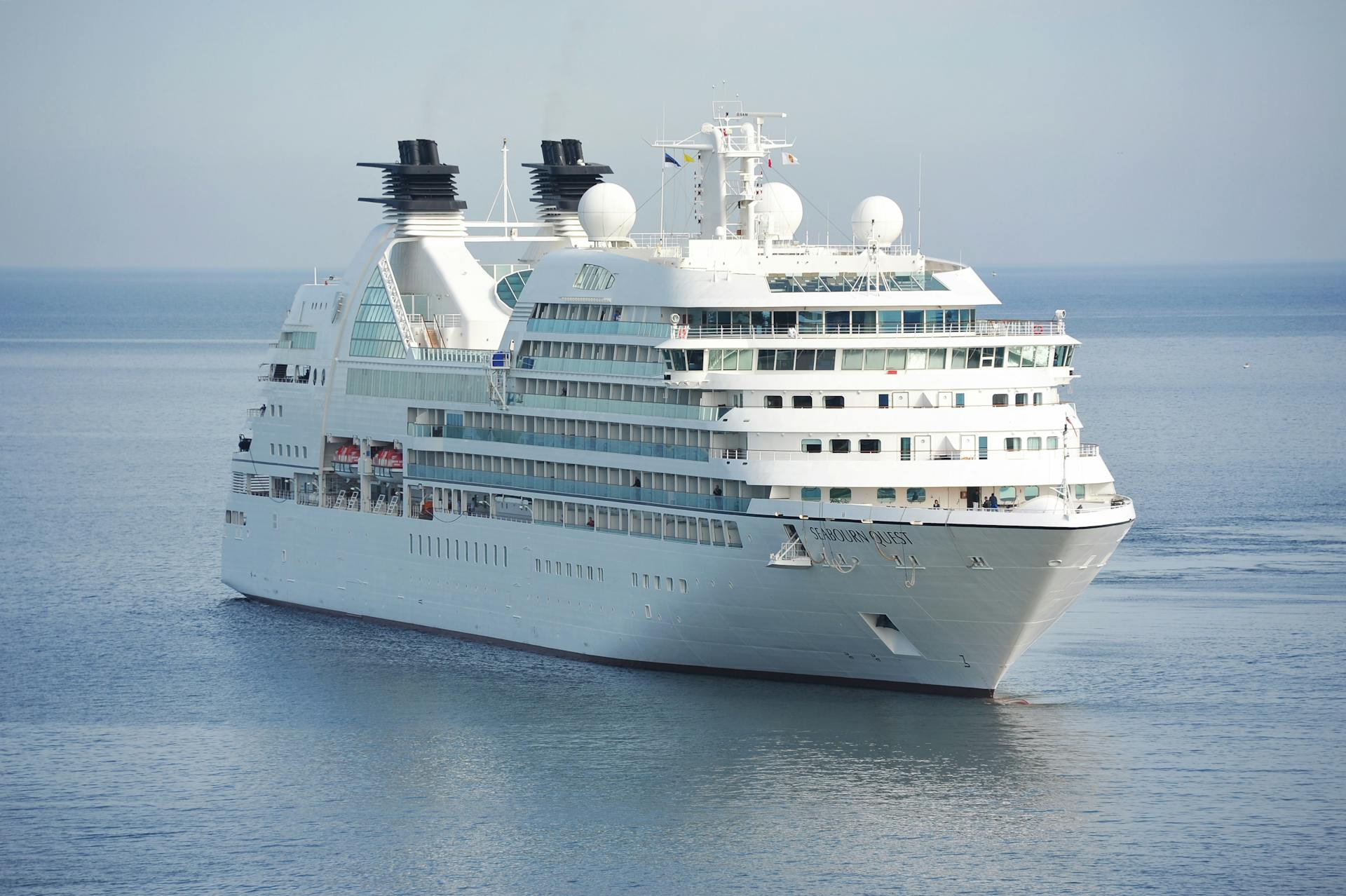
Carnival Corporation & plc is one of the largest cruise companies in the world, with a market share that's hard to ignore. With a global presence in over 700 ports across 180 countries, they've managed to dominate the industry.
Their impressive fleet consists of 10 cruise line brands, including Carnival Cruise Line, Princess Cruises, and Holland America Line. This diverse range of brands allows them to cater to a wide range of customers, from budget-friendly options to luxury getaways.
Their dominance in the industry has a significant impact on the global economy, generating billions of dollars in revenue each year.
Worth a look: Global Ports
Financials
Carnival Corporation & plc is a global cruise giant, and its financials are impressive. For fiscal year 2023, the company reported a total annual revenue of $21.6 billion.
This is a significant increase from the previous year, with revenue growing by $9.4 billion. The company had a net income loss of $74 million in 2023.
Demand and improvements in ticket prices were key drivers of this revenue growth, benefiting all of Carnival's brands. The company reached historical occupancy levels for the second half of 2023.
Carnival's North America and Australia segment is its largest source of revenue, making up a significant portion of the company's overall income.
Industry and Market
Carnival Corporation & plc is a giant in the cruise industry, recognized for its vast scale and depth of brand offering. It's a benchmark for quality and service in the leisure travel space.
The company's global presence is a key factor in its success, allowing it to reach a wide range of customers worldwide. Its operational expertise is also noteworthy, setting a high standard for the industry.
By consistently adapting to evolving consumer trends and leveraging its technological capabilities, Carnival maintains its competitive edge.
Market Position and Industry Impact
Carnival Corporation & plc is a benchmark for quality and service in the leisure travel space due to its vast scale and depth of brand offering.
The company's global presence is a significant factor in its success, allowing it to reach a wide audience and establish itself as a trusted entity in the maritime and leisure sectors.
Carnival consistently adapts to evolving consumer trends, which has helped it maintain its competitive edge in the industry.
Its emphasis on customer experience, safety, and innovation is a key differentiator that sets it apart from its competitors.
Competitor Comparison
In the cruise industry, understanding the competitors is crucial for success. Carnival Corporation & Plc has 112,000 employees, the largest number among its competitors.
Royal Caribbean Cruises Ltd and Carnival Corporation & Plc both have their headquarters in the United States of America, specifically in Miami, Florida. They are both public entities.
Norwegian Cruise Line Holdings Ltd also has its headquarters in Miami, Florida, but it has significantly fewer employees than its competitors, with 36,500 staff members. This could be due to its smaller scale of operations.
A different take: Victory Cruise Port Canaveral Fl
Here's a comparison of the key parameters of the major cruise line companies:
MSC Cruises SA, a private entity, is based in Geneva, Switzerland, and has a significantly smaller number of employees, with only 250 staff members. American Cruise Lines, Inc. is also a private entity, based in Guilford, Connecticut, and has an even smaller number of employees, with only 201 staff members.
Check this out: Carnival Cruise Group Phone Number
Business Model and Operational Excellence
Carnival Corporation & plc generates revenue primarily through ticket sales, onboard spending, and ancillary services like shore excursions and specialty tours.
The company's business model leverages economies of scale, advanced marine technology, and strategic capital allocation to achieve operational efficiency and customer satisfaction.
Carnival continually refines its operations to deliver consistently memorable vacation experiences, optimizing its fleet management and enhancing fuel efficiency through technological innovation.
The firm implements best practices in onboard hospitality to ensure a high level of customer satisfaction.
Carnival operates a combined fleet of 93 ships across nine cruise line brands and one cruise experience brand.
In June 2023, Carnival restructured its corporate umbrella, creating six new separate units with full executive control of the brands in their portfolio.
Cruise Brands and Portfolio
Carnival Corporation & plc has a diverse portfolio of cruise lines that cater to different types of travelers. Its flagship brands include Carnival Cruise Line, Holland America Line, Princess Cruises, and Seabourn.
Each brand is tailored to meet unique customer needs and preferences, offering experiences ranging from family vacations to ultra-luxury cruises. This approach broadens its market appeal and reinforces the company's resilience in a dynamic travel industry.
The company has also expanded its reach through partnerships and joint ventures, such as the agreement with China Merchants Group to develop a new cruise brand in China. This partnership aims to tap into the growing Chinese cruise market and provide unique experiences for Chinese travelers.
Here are some of the cruise lines under Carnival Corporation & plc's portfolio:
- Carnival Cruise Line
- Holland America Line
- Princess Cruises
- Seabourn
- P&O Cruises
P&O Cruises has a rich heritage, dating back to P&O's first passenger operations in 1837, and operates a fleet of seven ships dedicated to serving the British market.
Discover more: P&O Cruises Australia
Global Brand Portfolio
Carnival Corporation & plc oversees some of the most recognized cruise lines in the world.
Its extensive brand portfolio includes flagship brands like Carnival Cruise Line, Holland America Line, Princess Cruises, and Seabourn. These brands cater to diverse customer needs and preferences, ensuring a wide range of travel experiences.
P&O Cruises, a subsidiary of Carnival Corporation, has the oldest heritage of any cruise line in the world, dating back to P&O's first passenger operations in 1837. This rich history sets it apart from other cruise lines.
The company's diversified approach broadens its market appeal and reinforces its resilience in a dynamic travel industry. This is evident in its ability to adapt to changing customer needs and preferences.
Carnival Corporation operates a fleet of 91 ships worldwide, making it the largest global cruise company.
Expand your knowledge: White Star Lines
China Cruise Brand
Carnival Corporation has been expanding its presence in China through strategic partnerships. Carnival signed a Memorandum of Understanding (MoU) with China Merchants Group in February 2015 for two joint ventures.

China Merchants Group is a state-owned company founded in 1872, focusing on infrastructure, transportation, real estate development, and financial services. Carnival currently serves the Chinese market through its Princess and Costa brands.
In October 2015, Carnival signed a deal with two Chinese companies, SWS (Shanghai Waigaoqiao Shipbuilding Co Ltd) and China Investment Corp, worth USD 3,88 billion. The joint venture will have shipbuilding orders with SWS.
The joint venture plans to build up to 5 units per year for the next 15-20 years. All ships will be China-homeported/flagged and will have technical support and design plans provided by Fincantieri.
Here are the key details of the joint venture:
In February 2017, Carnival Corp and CSSC announced an agreement to build 2 new ships for the new joint venture CSSC Carnival Cruise Shipping Ltd/ADORA CRUISES. The deal was officially signed in early-November 2018.
Fathom Cruise Line (Cuban Itineraries)
Fathom Cruise Line (Cuban Itineraries) offers a unique experience, visiting the vibrant island of Cuba. Fathom's Cuba cruises typically range from 4 to 7 nights.
Suggestion: Carnival Cruise Line Cuba
With a focus on immersive cultural experiences, Fathom's itineraries include stops in Havana, Santiago de Cuba, and Cienfuegos. These ports allow passengers to engage with local communities and learn about Cuba's rich history and culture.
Fathom's Cuba cruises often include excursions such as a visit to a local farm or a tour of a historic neighborhood. These experiences give passengers a chance to connect with the Cuban people and gain a deeper understanding of the island's culture.
Fathom Cruise Line is a brand that offers a distinct type of cruise experience, focusing on cultural immersion and community engagement.
Innovations and Technology
Carnival Corporation & plc has made significant investments in technology to enhance the cruise experience. The Ocean Medallion is a small, wearable device that stores a customer's information and preferences.
The Ocean Medallion is equipped with Bluetooth and NFC technology, allowing it to communicate with other devices on the ship and in the cruise terminal. It also has no on/off buttons or navigation menus, making it easy to use.
The medallion can be worn around the wrist, neck, or loosely, and it's always on and working. It can also be used as a cabin key, opening doors to the stateroom.
The Ocean Compass, accessible through the medallion or mobile devices, serves as a virtual concierge, providing access to onboard services and information. This feature is also available through in-cabin infotainment systems, digital kiosks, and interactive LED screens throughout the ship.
As of 2023, Ocean Medallion accessories are available for purchase, including bracelets, lanyards, clip-ons, necklaces, and keychains. Prices range from $7 to $15 for leather and carabiner keychains, respectively.
The Ocean Ready App streamlines vacation planning, making it easier for customers to manage their cruise itinerary, embarkation, and debarkation. It also facilitates travel logistics, such as luggage identification and delivery to the stateroom.
ICT Spend & Priorities
Carnival Corporation & Plc likely spends a significant amount on technology areas, according to IT Client Prospector. This intelligence enables us to understand the company's digital strategy.
The company's ICT spend can be broken down into various areas, including IT infrastructure, software, and services. This breakdown is crucial for understanding the company's priorities.
Carnival Corporation & Plc's ICT spend is likely focused on enabling digital transformation and improving customer experiences. This is reflected in the company's technology priorities.
The company's ICT spend is likely significant, with a focus on areas such as cloud computing, cybersecurity, and data analytics. These areas are critical for supporting digital transformation and improving business outcomes.
Ocean Ready App
The Ocean Ready App is a game-changer for cruisers. It streamlines vacation planning, embarkation, and debarkation, making the entire process smoother and hassle-free.
With Ocean Ready, you can simply board the ship, and the Ocean Medallion will have all the necessary information about you and your booking. This eliminates the need to worry about paperwork and logistics.
The app facilitates travel logistics by allowing customers to be immediately recognized by the Carnival Corporation meet-and-greet crew at airports. They'll then be transferred to the cruise port via "OceanLand Express" buses.
As a result, you can skip the usual chaos at cruise terminals and enjoy a more relaxed and enjoyable experience.
In-Depth Customer Experience
Carnival Corporation & plc truly understands the importance of delivering a comprehensive vacation experience. From elaborate themed cruises to culturally immersive itineraries, each journey is meticulously designed to provide unforgettable memories.
Carnival's itineraries are incredibly diverse, ranging from explorations of remote natural wonders to vibrant urban destinations. This ensures that every traveler finds a voyage that resonates with their personal interests and lifestyle expectations.
With high-quality dining options and award-winning onboard entertainment, Carnival's focus on the customer experience is evident.
Impact and Challenges
The COVID-19 pandemic had a significant impact on Carnival Corporation & plc, with all cruise ship itineraries cancelled in March 2020.
The company reported 55 passenger deaths on its ships, and eventually decided to dispose of 18 ships, which is 12% of the global fleet.
Carnival Corporation & plc announced in September 2020 that it would delay the delivery of several ships already on order as part of its cost-cutting plan.
The company's adjusted net loss in the third quarter was a staggering $1.7 billion, and its liquidity and financial position were severely affected.
Discover more: Montreal Cruise Ships Holland America Cruise Ships
COVID-19 Pandemic Effects
The COVID-19 pandemic had a devastating impact on the travel and tourism industry, with Carnival Corporation & plc experiencing a major setback. In March 2020, all cruise ship itineraries were cancelled due to the pandemic.
Carnival Corporation & plc reported 55 passenger deaths on its ships, and the company was forced to dispose of 18 ships, which is a full 12% of the global fleet. By September 2020, five ships had already been scrapped.
The company's financial position was severely impacted, with an adjusted net loss of $1.7 billion in the third quarter. The Centers for Disease Control and Prevention's no-sail rule prohibited cruising in the U.S. until October 31, 2020, at the earliest.
Carnival Corporation & plc was in an excellent cash position, with $9.5 billion, but still suffered an adjusted net loss of $1.9 billion in the fourth quarter. The company's CEO was confident that universal testing would help start the cruising industry, but it would take time to recover.
If this caught your attention, see: Ships of Carnival Cruise Line
Environmental Law Violations

Environmental Law Violations have been a significant issue for the cruise industry, particularly for Carnival Corporation & plc. In 2002, they pleaded guilty to falsifying records of oil-contaminated bilge water dumped into the sea from 1996 through 2001.
They were ordered to pay $18 million in fines and perform community service, received five years' probation, and had to submit to a court-supervised worldwide environmental-compliance program for each of its cruise ships. This was a major wake-up call for the industry.
In 2016, Princess Cruise Lines was fined $40 million for dumping oiled waste into the seas and lying to cover it up. The largest-ever criminal penalty for intentional vessel pollution was a stark reminder of the consequences of such actions.
The practices began in 2005 and persisted until August 2013, when a newly hired engineer blew the whistle. As part of its plea agreement, ships of the parent company Carnival Cruise lines were subjected to a court-supervised environmental compliance plan for five years.
Here are some key statistics on the environmental law violations committed by Carnival Corporation & plc:
These fines are a testament to the importance of environmental compliance and the need for companies to take responsibility for their actions.
Shareholder and Benefits
As a shareholder of Carnival Corporation, you're entitled to some pretty cool perks. To qualify, you must own at least 100 Carnival shares.
One of the benefits of being a shareholder is receiving onboard credit, which can be a great way to save money on your next cruise.
To apply for these benefits, you'll need to have your shares in good standing, meaning you must be a registered shareholder with the company.
Shareholders can also enjoy other benefits, such as special discounts and promotions, but these are subject to change and may not be available on all sailings.
If you're an employee, travel agent, tour conductor, or booking with Carnival, you won't be eligible for these shareholder benefits.
History and Leadership
Carnival Corporation & plc was founded in 1972 as Carnival Cruise Line by Ted Arison. The company's maiden ship was the Mardi Gras, which was converted into an ocean liner.
Ted Arison's son, Micky Arison, is currently the Chairman of the Board, a position he has held since 2024. Josh Weinstein serves as the President, CEO, and Chief Climate Officer.
Carnival Corporation has undergone significant changes over the years, including a name change to Carnival Corporation in 1994. The company has also acquired several other cruise line operators, including P&O Cruises, Holland America Line, and Costa.
Here is a list of some of the key acquisitions made by Carnival Corporation:
- Holland America Line
- Windstar Cruises
- Seabourn Cruise Line
- Costa Cruises
- Cunard Line
- AIDA Cruises
- Princess Cruises
In 2003, Carnival Corporation acquired P&O Princess Cruises plc, which was later renamed Carnival plc. This acquisition marked a significant milestone in the company's history, allowing it to expand its global presence and offerings.
Recent Developments
Carnival Corporation & plc has been making significant strides in recent years.
In 2023, the company implemented cost optimization initiatives to increase cost efficiencies.
These initiatives included installing SpaceX's Starlink next-generation internet across the fleet, which is expected to reduce cost per megabit.
Carnival also added three new ships during 2023, expanding its fleet.
The company began construction on Celebration Key in Grand Bahama, the largest and closest exclusive destination expected to open in 2025.
Frequently Asked Questions
What do 100 shares of Carnival stock get you?
Owning 100 shares of Carnival stock can unlock a "vacation dividend" of $50 to $250, depending on cruise length. This perk is available with Carnival, Norwegian Cruise Line, and Royal Caribbean Cruise Lines.
Who is Carnival Corporation owned by?
Carnival Corporation is owned by the American-British conglomerate Carnival Corporation & plc, a global leader in the cruise industry. This parent company operates a fleet of ten cruise lines, including Carnival Cruise Line.
What are the top 5 cruise companies in the world?
The top 5 cruise companies in the world are Carnival Corporation & plc, Royal Caribbean Cruises Ltd, MSC Cruises SA, Norwegian Cruise Line Holdings Ltd, and TUI AG, Genting Bhd. These companies dominated the global cruise industry in 2021 with the largest number of passengers carried.
Sources
Featured Images: pexels.com


